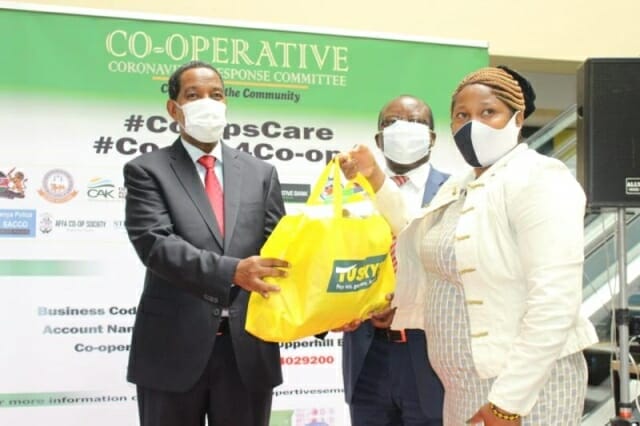News > Blog
Kenyan Cooperatives Demonstrate Resilience & Concern for the Community to Mitigate the Effects of Covid-19
Published 07/02/2020 by Global Communities

Ashley Holst, Global Communities Technical Specialist Cooperatives & Inclusive Businesses
Read original blog post on Medium.comAs we celebrate International Day of the Cooperative this year, we recognize that over the last several months cooperatives have demonstrated their resilience and their dedication to bettering the world. The cooperative sector in Kenya jumped into action to help their members and communities during the Covid-19 pandemic and resulting economic crisis. From individual cooperatives using their own funds to provide PPE and food to neighbors to national cooperative organizations initiating large scale assistance programs, the Kenyan Cooperative Sector has made a huge impact in just a few months.
Just a few short weeks after Covid-19 and related “stay at home” orders arrived in the US, Kenya began feeling its effects as well. New daily cases began to drastically increase in early May and as of mid-June, Kenya had over 6,000 cases — even with limited testing sites outside of city centers. Curfews and travel bans have been imposed to deter the spread of Covid-19 into the rural counties, but have also made business difficult. SMEs including cooperatives often struggle to withstand temporary closures, lower sales, and higher input prices. Where they do differ is cooperatives’ concern for the community and their membership. In crises like these, Cooperatives tie their business interests with a desire to support their communities.
To better understand the effects of Covid-19 and the efforts of cooperatives to better their world, the USAID/CLEAR program began conducting monthly surveys with 24 cooperatives in May[1]. The data shows that Kenyan Cooperative businesses and their members have felt the effects of Covid-19 yet are actively working to meet the needs of their members and communities to keep people healthy and financially stable.
Of the Cooperative businesses participating in the study, all but one said that their operations had been impacted by Covid-19. On average Cooperatives reported a 30% decrease in revenues with some claimed losses up to 60%. The majority (70%) stated that social distancing restrictions had limited their operations and over 30% of cooperative businesses sited closed markets or points of sale as a top challenge. This data, which continues to be collected monthly, will guide the program to develop strategies to support cooperative businesses throughout the remainder of the shut down and prepare to re-open when allowed. Specifically, the results show that helping Cooperatives adjust production/services to meet social distancing guidelines and identifying virtual (or socially distant) points of sale would help them to overcome reduced revenues and increase their ability to support their members.
Beyond their business, the data shows that cooperatives also embody Concern for the Community, the seventh principle of cooperatives. Across all eight countries, Cooperatives reported three primary challenges for their members: lower income, delays in payment for products/services, and difficulty accessing food due to unavailability or higher cost[2].
Response to Lower Incomes & Delay in Payment: One of USAID/CLEAR’s intermediate results is ‘Improved Cooperative Businesses,’ a task which requires capacity building in budgeting and risk planning in order to be successful. CLEAR’s cooperative coaches work to develop sustainable budgets and pricing models to ensure cooperatives can pay members and employees fairly and in a timely fashion. This work will continue, perhaps with more purpose during and following Covid19. This season has highlighted importance of a strong budget, retained capital for emergencies, proper equity allocations and risk planning. While CLEAR does not provide loans for Cooperatives, the program does help broker conversations around access to finance and advocates for equal opportunity lending. USAID/CLEAR also partners with professional and apex organizations to ensure cooperatives have full access to all resources, including private sector resources alongside SMEs.
Response to Increased Food Insecurity: Cooperatives have taken on the responsibility of addressing the increasing need. Anecdotally, one of CLEAR’s incubated cooperatives, Uprising Housing Co-op, has distributed supplies to their members and to residents of Nairobi’s informal housing neighborhoods. Recognizing the effects of reduced or fully eliminated income sources and the growing food insecurity, The Kenyan Cooperative Coronavirus Response Committee (CCRC) was formed. The CCRC is non-clinical in nature and led by the State Department of Cooperatives and other stakeholders, including CLEAR. The mission of the CCRC is to mitigate the negative shocks by Covid-19 and help to deter the spread of Covid-19 through accurate information and PPE distribution utilizing cooperative networks. The CCRC has distributed “Co-op Kits” (including cooking oil, rice, food stuff and PPE) to 3,500 households through Cooperative Societies. Cooperatives are distributing the kits within their communities to members and non-members alike. The kits themselves are assembled at stores throughout the country thus also stimulating local businesses. These two examples show the ways in which Cooperatives are resilient and are using their collective strength to contribute to the health and wellbeing of their communities.
While the results of our study are disheartening, showing widespread negative impacts of Covid-19, they also show a commitment of Cooperatives to support their members and community. Data shows the majority of cooperatives had already initiated some outreach and over 80% were preparing for additional response. As we recognize International Day of the Cooperative we celebrate how Cooperatives in Kenya continue to demonstrate a commitment to mitigating the effects of Covid-19 in tandem with their own business success, a true symbol of both cooperative resilience and concern for community.
[1] Global Communities is one of four organizations (Land O’Lakes Venture37; Equal Exchange; NCBA CLUSA) participating in this research funded through USAID’s Cooperative Development Program. In total, data was collected from 93 cooperatives across 8 CDP countries. NCBA CLUSA also helped to gather data in Kenya.
[2] Covid-19 Impact on Agricultural Cooperatives: Round One Brief. Tango International. May 2020.




